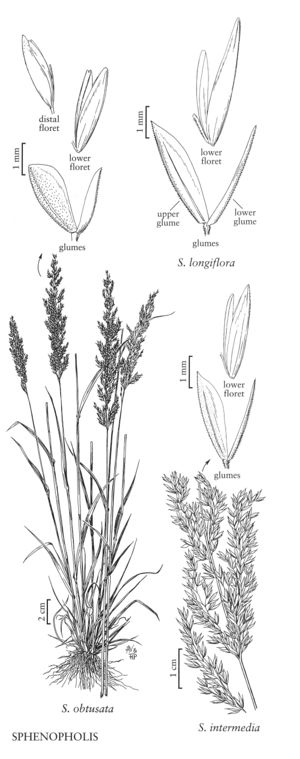Difference between revisions of "Sphenopholis longiflora"
imported>Volume Importer |
GeoffLevin (talk | contribs) m (Restored authority to match print) |
||
| (2 intermediate revisions by one other user not shown) | |||
| Line 1: | Line 1: | ||
{{Treatment/ID | {{Treatment/ID | ||
|accepted_name=Sphenopholis longiflora | |accepted_name=Sphenopholis longiflora | ||
| − | |accepted_authority=(Vasey | + | |accepted_authority=(Vasey) Hitchc. |
|publications= | |publications= | ||
|common_names=Bayou wedgegrass | |common_names=Bayou wedgegrass | ||
| Line 21: | Line 21: | ||
-->{{Treatment/Body | -->{{Treatment/Body | ||
|distribution=Ark.;Tex.;La. | |distribution=Ark.;Tex.;La. | ||
| − | |discussion=<p><i>Sphenopholis longiflora</i> grows in forest bottoms along bayous and streams, from 0-50 m, in Texas, Arkansas, and Louisiana. Erdman (1965) treated both <i>S. longiflora</i> and <i>S. intermedia</i> as <i>S. obtusata | + | |discussion=<p><i>Sphenopholis longiflora</i> grows in forest bottoms along bayous and streams, from 0-50 m, in Texas, Arkansas, and Louisiana. Erdman (1965) treated both <i>S. longiflora</i> and <i>S. intermedia</i> as <i>S. obtusata</i> var.<i> major</i> (Torr.) Erdman. They are morphologically distinct from each other, and from <i>S. obtusata</i>.</p> |
|tables= | |tables= | ||
|references= | |references= | ||
| Line 30: | Line 30: | ||
-->{{#Taxon: | -->{{#Taxon: | ||
name=Sphenopholis longiflora | name=Sphenopholis longiflora | ||
| − | |authority=(Vasey | + | |authority=(Vasey) Hitchc. |
|rank=species | |rank=species | ||
|parent rank=genus | |parent rank=genus | ||
| Line 43: | Line 43: | ||
|publication year= | |publication year= | ||
|special status=Endemic | |special status=Endemic | ||
| − | |source xml=https:// | + | |source xml=https://bitbucket.org/aafc-mbb/fna-data-curation/src/200273ad09963decb8fc72550212de541d86569d/coarse_grained_fna_xml/V24/V24_890.xml |
|subfamily=Poaceae subfam. Pooideae | |subfamily=Poaceae subfam. Pooideae | ||
|tribe=Poaceae tribe Poeae | |tribe=Poaceae tribe Poeae | ||
Latest revision as of 22:27, 3 December 2021
Culms to 70 cm. Sheaths smooth or retrorsely scabridulous, usually glabrous, sometimes pubescent; ligules 0.7-2.6 mm, glabrous, erose; blades 8-18 cm long, 2-10 mm wide, flat. Panicles 15-20 cm long, 1.5-2.5 cm wide, nodding, not spikelike, spikelets loosely arranged. Spikelets 4-5.2 mm. Lower glumes about 1/3 as wide as the upper glumes; upper glumes 3-3.9 mm, elliptical to oblanceolate, not subcucullate, width/length ratio 0.17-0.26, apices acute; lowest lemmas 3.1-4.2 mm, glabrous; distal lemmas usually smooth on the sides, rarely scabridulous distally, unawned; anthers 0.2-0.7 mm. 2n = 14.
Distribution
Ark., Tex., La.
Discussion
Sphenopholis longiflora grows in forest bottoms along bayous and streams, from 0-50 m, in Texas, Arkansas, and Louisiana. Erdman (1965) treated both S. longiflora and S. intermedia as S. obtusata var. major (Torr.) Erdman. They are morphologically distinct from each other, and from S. obtusata.
Selected References
None.
